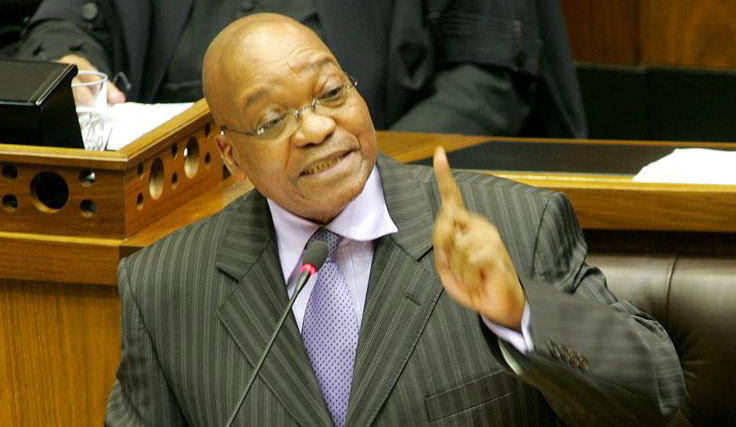South Africans have a history of violence – Zuma

Johannesburg — South Africans do not just attack foreigners, they have a history of violence, President Jacob Zuma has said. He also urged that the word “xenophobia” not be used “excessively” because it would give the impression that most South Africans were xenophobic, when he said they were not.
Zuma addressed journalists following a meeting of business, religious, labour and civil society leaders at the Sefako Makgatho Presidential Guest House in Pretoria yesterday.
“No one can say South Africans attack foreigners only,” Zuma said in reply to journalists’ questions.
“We have a history that these things happen. There is violence here that nobody has forgotten. Political violence here you couldn’t say was xenophobic, xenophobia. At some point I was giving an example, I was explaining to someone who was doing research to say, that research was not accurate to say the majority of South Africans are xenophobic. We are not.
“What I was saying is you can’t interpret when people are fighting from that simple logic, for example in Johannesburg you know at times the entire Soweto was fighting the hostels where the majority was Zulus, and you couldn’t say that was xenophobic.
“Some of these things were manipulated by those who were in charge at the time. But there was a lot of violence in KwaZulu-Natal amongst Zulus, would you say they were xenophobic? I don’t think we should use this simple word because it is easy to use, excessively, because it gives the wrong impression that South Africans are xenophobic. We are not. There are a minority, and we will deal with that.”
Zuma also said the incident in Alexandra last week, when Mozambican Emmanuel Sithole, was brutally stabbed in pictures published on the front page of the Sunday Times, was “purely criminal” but because “it happened at the time of the xenophobic attacks, it is now said this is how we kill people in South Africa”.
Zuma again warned that these incidents be investigated so that they could be reported “appropriately”.
Zuma said he was confident his new initiative, which amongst others consists of a cabinet committee, would help quell the violence this time around and stop xenophobic attacks for good.
Meanwhile, the attacks on foreign nationals over the last few weeks have been described as embarrassing and inhumane by Deputy Agriculture Minister Bheki Cele.
“We can’t behave like animals. There is no justification whatsoever for the way we’re behaving,” he said
“As a South African, I went to exile myself. I stayed in several countries, African countries mostly during my exile days. I’m embarrassed, I feel humiliated myself. I feel dehumanised even together with the people we’re trying to dehumanise. It can’t be accepted,” Cele said.
Cele, a former national police commissioner, said if he was still in his position he would have tried his best to intervene before things got out of hand, as he did in KwaZulu-Natal in 2008. “It’s a question of are they taking the jobs? Even if there is genuineness (sic) in the things we complain about, which I guess somewhere there are complaints that might be genuine, but we can’t respond the way we’re doing.”
It has been thought that Zulu King Goodwill Zwelithini and President Jacob Zuma’s son Edward may have played a role in starting the attacks on foreign nationals with recent public utterances they made.
Following the attacks in Durban, Zwelithini held an anti-xenophobia imbizo in Durban on Monday. Asked about whether Zwelithini’s address would have a positive impact, Cele said he could not say.
However, being a Zulu himself, he said the king commanded much loyalty and respect and his intervention needed to be welcomed, albeit it being a little late. “Let’s welcome and be thankful that the king acted. It could have been earlier, I agree, but let’s be thankful that he did act. We don’t have the results of the impact, but the fact that he spoke is taking us in the right direction.”
The presidency said seven people have been killed in the last week — three South Africans and four foreigners. This included the murder of Mozambican national Emmanuel Sithole in Alexandra, Johannesburg, on Saturday. Pictures of him being attacked and stabbed were published on the front page of the Sunday Times.
Cele did not believe the pictures should have been published. “That picture could have been taken and given to police without displaying it. What’s wrong with that? Take the same picture, send them to police and please spare [us]. Especially things over which you’ve no control over who sees it.”
Children had access to newspapers and Cele did not believe it was right for them to see such brutality.
l Military top brass are keeping mum on the deployment of SANDF troops to KwaZulu-Natal.
SANDF spokesperson Xolani Mabanga said that troops had been deployed in the province, which has seen the lion’s share of xenophobic violence and unrest.
“This is an operation that’s led by the police and if I were to tell anyone where the soldiers are, this would compromise the secrecy of the operation and undermine it,” he said. “We can say for sure that our troops are in the province, unfortunately that’s all I can divulge,” he said.
The police and army raided the Jeppestown hostel on Tuesday night, searching for weapons after an announcement by Defence Minister Nosiviwe Mapisa-Nqakula that soldiers would aid in curbing attacks on foreign nationals.
Meanwhile, 11 men were arrested for being in possession of drugs and stolen property during a raid by police and the army in the Jeppestown men’s hostel in central Johannesburg, police said on Wednesday.
National police spokesperson Solomon Makgale said large bags of dagga and possibly stolen items were recovered at the hostel. It was not immediately clear what the estimated value of the dagga was. – afp











Comments